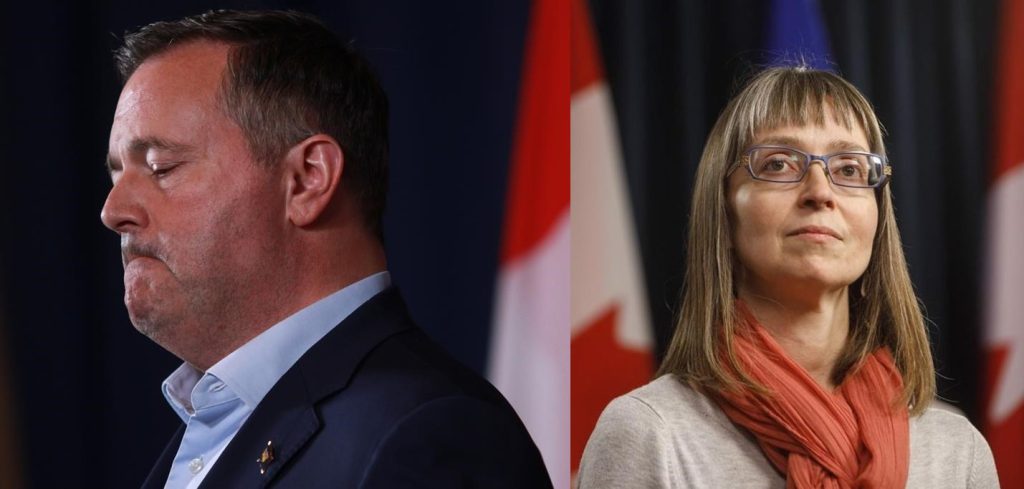Alberta violates Public Health Act, Hinshaw not decision maker on COVID recommendations: Judge

Posted August 1, 2023 5:45 pm.
Last Updated August 1, 2023 5:51 pm.
An Alberta court decision Tuesday says former Chief Medical Officer of Health (CMOH) Deena Hinshaw did not have the final say regarding COVID-19 health recommendations.
Justice B.E. Romaine released the 90-page decision, which includes the province and Hinshaw as the respondents, and Rebecca Marie Ingram, Heights Baptist Church, Northside Baptist Church, Erin Blacklaws, and Torry Tanner as the applicants.
“The Public Health Act requires that decisions with respect to public health orders must be made by the CMOH, or her statutorily- authorized delegate. The final decisions implemented by the impugned Orders in this case were made by the cabinet of the government of Alberta or by committees of cabinet,” the decision reads.
“While the CMOH made recommendations and implemented the decisions of the cabinet and committees through the impugned Orders, she deferred the final decision making to cabinet.
“Although Dr. Hinshaw was maligned during the pandemic and afterwards as the symbol of the restrictions, she was not in fact the final decision-maker. The delegation of her final decision-making authority to cabinet is not permitted by section 29 of the Public Health Act.”
Romaine’s decision continues, saying had Hinshaw enacted the impugned orders, they would not have been unconstitutional.
“While they may have infringed certain of the Applicants’ rights under the Canadian Charter of Rights and Freedoms, being Schedule B to the Canada Act 1982 (UK), 1982, c 11 and the Alberta Bill of Rights, RSA 2000, c A-14, these limitations were amply and demonstrably justified as reasonable limits in a free and democratic society pursuant to section 1 of the Charter and that they were enacted pursuant to a valid legislative purpose,” she said.
Related Stories:
-
Alberta names new chief medical officer
-
Dr. Deena Hinshaw recommendations, warnings revealed in released documents
The charges against the province and Hinshaw included allegations of infringement of indoor gatherings, private residence restrictions, primary or secondary school restrictions, and outdoor gathering restrictions, which were brought up by all the applicants. All of them blamed Hinshaw in their affidavits. Court action began in 2020.
“Although submissions with respect to this issue are scattered and sometimes inconsistent, the Applicants submit in their final argument that the impugned Orders are ultra vires the purpose of the Public Health Act and are ultra vires section 29 of the Public Health Act,” she said.
Hinshaw should have had final say in COVID restrictions: Judge
When it comes to the Public Health Act, Romaine says it deals with “communicable diseases and public health emergencies.”
She defines a public health emergency as “an epidemic or pandemic disease … that poses a significant risk to the public health,” adding that a public health emergency at the time is not in dispute.
Romaine also says when there is an emergency, the CMOH is given powers to deal with communicable diseases, and if a communicable disease is confirmed present, the CMOH can “take whatever steps the medical officer of health considers necessary.”
That includes:
- to suppress the disease in those who may already have been infected with it,
- to protect those who have not already been exposed to the disease,
- to break the chain of transmission and prevent spread of the disease, and
- to remove the source of infection.
She also says when a CMOH determines a person or groups of people engaging in activities that could transmit an infectious agent, they can prohibit the people from engaging in the activity by order “for any period and subject to any conditions that the medical officer of health considers appropriate.”
The activities include attending school, engaging in the “occupation of the person or the class of persons, “and anything that brings contact between multiple people.
“While involvement of elected officials in these important decisions may be desirable and even necessary, this involvement should have been structured in such a way as to mitigate the risk of political priorities interfering with the informed and well-qualified judgment of the CMOH, as provided in the Public Health Act, without ignoring the underlying public interest,” Romaine’s conclusion reads.
“In conclusion, I declare that the impugned Orders were ultra vires of the Public Health Act because they were based on a interpretation of the Public Health Act that gave final decision making authority over public health orders to elected officials.”
Related Stories:
-
Majority of COVID violations not making it to court: JCCF
-
Alberta Court of Appeal dismisses unvaccinated woman’s case for organ donation
-
‘Hypocrisy’: Alberta’s healthcare workers outraged over Hinshaw’s bonus amid health cuts
Alberta government was ‘calling the shots’ during health restrictions: expert
Lorian Hardcastle, associate professor in the faculty of law and the Cummings School of Medicine at the University of Calgary, says there was ambiguity over who the decision maker was throughout the pandemic.
“Hopefully, this decision acts as a catalyst for the government to revisit the Public Health Act and determine what authority should a CMOH have… what authority should government have, what independence should a CMOH have, and to make sure that the legislation matches up with the political reality,” she told CityNews.
She says it remains unclear what kind of dynamic there was between Hinshaw and the province, whether they told her she was an advisor or if she came to that conclusion on her own.
However, she says it is “clear” that the province was calling the shots in the provincial COVID-19 health restrictions.
“I think there certainly is fault here. The law was clear. The law was pointed out to the government. They knew what the legislation said,” Hardcastle said.
“Public health orders are to come from the CMOH. She can seek the advice and input of cabinet, but the decisions are hers to make.”
She says the Public Health Act was revised three times during the pandemic, and the province could have amended the act to ensure government officials had the final say rather than overstepping Hinshaw.








